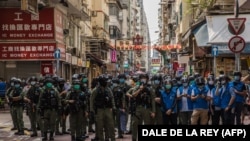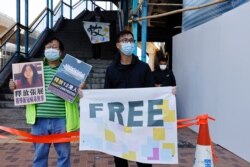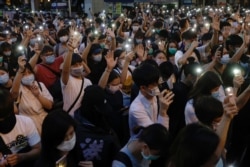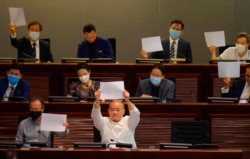During a June 11 news conference, Chinese Foreign Ministry Spokesperson Wang Wenbin addressed the U.K. government’s latest Six-monthly Report on Hong Kong, released the previous day.
Wang said the report is “full of ideological bias” and a continuation of the U.K.’s “moves to confound right with wrong and distort facts.”
“The groundless accusations against China's policies in Hong Kong made by [U.K.] Foreign Secretary Dominic Raab in the foreword of the report again constitute gross interference in Hong Kong affairs and China's domestic affairs. We strongly condemn and firmly oppose this,” he said.
Wang reaffirmed that Hong Kong is part of China under its “One Country, Two Systems” rubric. He said that Hong Kong continued to be governed in accordance with China’s constitution and that “a high degree of autonomy has been earnestly implemented.”
“Hong Kong residents' lawful rights and freedoms have been fully guaranteed according to law,” Wang said.” These are undeniable facts. Everything we've done, whether it's the promulgation of the Law on Safeguarding National Security in the Hong Kong SAR or improving Hong Kong's electoral system, is aimed to uphold and improve the One Country, Two Systems institution.”
Wang’s claim that freedoms have been “fully guaranteed” and that accusations in the report are “groundless” is false.
In fact, Beijing’s recent moves have undermined the terms of the treaty under which Hong Kong was to come under Chinese sovereignty, along with the freedoms that Hong Kongers previously enjoyed.
First, some history. In 1984, the U.K. and People’s Republic of China signed the Sino-British Joint Declaration, which laid the groundwork for Beijing to regain sovereignty over Hong Kong in 1997 after more than a century of British colonial rule.
The document, which provided for a Hong Kong Special Administrative Region (SAR) under the authority of the People’s Republic of China, granted Hong Kong “a high degree of autonomy, except in foreign and defense affairs.”
Point five of the document states: “The current social and economic systems in Hong Kong will remain unchanged, and so will the life-style. Rights and freedoms, including those of the person, of speech, of the press, of assembly, of association, of travel, of movement, of correspondence, of strike, of choice of occupation, of academic research and of religious belief will be ensured by law in the Hong Kong Special Administrative Region. Private property, ownership of enterprises, legitimate right of inheritance and foreign investment will be protected by law.”
In line with China's “One Country, Two Systems” principle, which theoretically allows Hong Kong to maintain its own systems of law, governance, economy and finance, the policies of the joint declaration were to “remain unchanged for 50 years.”
The bilateral treaty was registered with the United Nations on June 12, 1985. The U.K. views the agreement as legally binding under international law, although it concedes the “treaty contains no enforcement or dispute provisions.”
Still, the U.K. maintains it has “an obligation and a right” to monitor the treaty’s implementation “closely.” The U.K.’s latest Six-monthly Report is the 48th in a series of monitoring missives sent to the Parliament and says China is “in a state of ongoing non-compliance with the Joint Declaration.”
By contrast, China announced in 2017 the treaty was “a historical document” that “no longer has any practical significance” nor is “binding for the central government’s management over Hong Kong."
In the Six-monthly Report, which covers July-December 2020, Raab said the U.K. had “seen three clear breaches of the Joint Declaration in the last year,” one of which fell outside of the reporting period.
The first breach was declared on July 1, 2020, after China imposed a new National Security Law (NSL) that criminalizes four categories of activities — secession, subversion of state power, terrorism and collusion with foreign entities. The law also gives authorities in Hong Kong and Beijing wide latitude to control the internet, media outlets, schools and other groups.
The U.K.-based rights group Amnesty International has said that under the law, anything can be viewed as a national security threat. According to the BBC, damaging public transportation facilities could be viewed as terrorism.
Transportation disruptions, including the deflation of bus tires, was a tactic pro-democracy demonstrators used during 2019-2020 Hong Kong protests. But Amnesty also documented arrests for peaceful activities like “possessing flags, stickers and banners with political slogans.”
New-York based Human Rights Watch said the security law was being used “to prosecute peaceful speech, curtail academic freedom, and generate a chilling effect on fundamental freedoms in the city.” It called the law “Beijing’s most aggressive assault on Hong Kong people’s freedoms since the transfer of sovereignty in 1997.”
Prior to the law’s passage, Johannes Chan, a legal scholar at the University of Hong Kong, told the BBC that Beijing was “imposing the People's Republic of China's criminal system onto the Hong Kong common law system, leaving them with complete discretion to decide who should fall into which system.”
The U.K. report says the second breach occurred on November 12, 2020, after new laws were enacted to disqualify elected legislators.
A resolution that the Standing Committee of China’s National People’s Congress (NPC) passed at the time permitted disqualifying any lawmaker in the Legislative Council of Hong Kong “who supports Hong Kong’s independence, refuses to acknowledge China’s sovereignty over the city, threatens national security, or asks external forces to interfere in the city’s affairs,” the Associated Press reported.
According to National Public Radio, the resolution “effectively gives Beijing veto power over who sits in Hong Kong's legislature.”
The resolution prompted all the pro-democracy legislators in Hong Kong to resign en masse, essentially leaving the legislative body without an opposition for the first time in its history.
In the Six-monthly Report, Raab said a third breach occurred in March 2021, when China enacted electoral changes in Hong Kong. This change allows Beijing to screen candidates for Hong Kong’s legislative council. Candidates must be nominated by the pro-Beijing Election Committee, which was expanded from 1,200 to 1,500 seats.
The move eliminated 117 seats on the electoral committee previously reserved for district councilors. Six district council seats in the legislative council were also scrapped.
This matters because, according to Reuters, district councils handle street-level municipal affairs and were Hong Kong’s “only fully democratic institution,” with 90 percent of the 452 district seats controlled by pro-democracy politicians after a 2019 election.
The electoral reform expands Hong Kong’s legislative council from 70 to 90 seats, but reduces the number of directly elected lawmakers from 35 to 20.
China’s state-run Xinhua news agency quoted Wang Chen, vice chairman of the NPC Standing Committee, as saying the changes were intended to ensure that “patriots" administer Hong Kong.
Carrie Lam Cheng Yuet-ngor, the chief executive of Hong Kong who was chosen by Beijing, had previously said Hong Kong’s electoral system needed to change so that “patriots” could rule the city-state.
The U.S. State Department expressed deep concern over the NPC’s decision to “unilaterally undermine Hong Kong’s electoral system.”
“This action further undermines the high degree of autonomy promised to people in Hong Kong and denies Hong Kongers a voice in their own governance, a move that the United Kingdom has declared to be a breach of the Sino-British Joint Declaration,” the State Department said.
Polygraph.info has previously reported on China's crackdowns on protests and pro-democracy figures.



